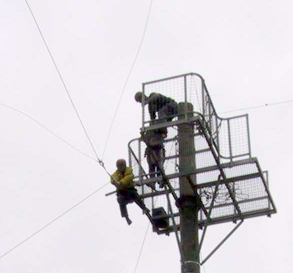Compartmentalizing
 Several years ago, I did the moral equivalent of bungee jumping. I jumped off of a 20-foot tower, connected to two taller towers by bungee cords, which made a giant swing.
Several years ago, I did the moral equivalent of bungee jumping. I jumped off of a 20-foot tower, connected to two taller towers by bungee cords, which made a giant swing.
While I am not unusually afraid of heights, neither am I unusually unafraid.
I managed to jump off the tower not by conquering my fear, but by hiding it. I did not let my reptilian brain know what I was about to do. I focused on following the instructions that the nice man gave me. I stood where he told me. I allowed him to clip me in. I stepped forward when he told me to. I jumped off the platform when he told me to.
Instantly, my reptilian brain was filled with surprise, outrage, and panic. "WHAT DO YOU THINK YOU ARE DOING?!?!?" it screamed at my mammalian brain. An incredible tsunami of emotion -- particularly an almost tangible feeling of surprise -- made it clear to me that my higher brain had been successful at hiding information from the reptile part. I was stunned to have such a clean division of information inside my own head prove itself to me so viscerally.
I guess I should not have been so surprised, since I have seen milder forms of this in myself before. I once was playing field hockey and someone got past me; without thinking of it, I deliberately hooked their foot with my stick to trip them. I was shocked immediately at my behavior (and apologized profusely) as I had not consciously desired to do that, but some part of my brain passionately didn't want the other person to get past and acted before my higher reasoning centers had time to call for a vote.
Perhaps it is more interesting that that my baser impulse winning out was rare enough that I remember it twenty-five years later: it says that I am pretty good at shutting down the base piece of my brain.
After jumping off the tower, I felt kind of studly to find that I could manipulate my own mind, but I was also aghast to see just how easy it is was to override my better judgement. Again, I suppose shouldn't have been surprised. There have been a number of well-documented cases where people overrode their better judgement to do very bad things.
In the Stanford Prison Experiment normal college students committed great acts of great cruelty when put in an environment when given the role of jailhouse guards. Similar effects were seen in Stanley Milgram's electroshock study, where people were instructed to give higher and higher shocks to somebody.
Still, I was sobered to discover that I am fundamentally no different.
Since I don't remember rampant tripping in games of field hockey, I have to assume that either I am an unusually evil creature or this ability to stifle a piece of the brain is common. (I prefer to think the latter.) That's also scary and can explain to me how people manage to commit atrocities and think they were "just doing their job".